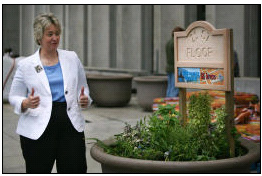|

|

Containers work well for gardeners who don�t have time or energy
By Urban Harvest
 Container
gardening is a great solution for gardeners who don�t have the
time or energy for a full-blown garden as well as wannabe
farmers that lack the proper space. Many gardeners at my
community garden are there because they lack sun in their home
landscapes or lack space because they live in apartments,
condominiums or townhouses. All are conditions potentially
resolved by the use of containers. Container
gardening is a great solution for gardeners who don�t have the
time or energy for a full-blown garden as well as wannabe
farmers that lack the proper space. Many gardeners at my
community garden are there because they lack sun in their home
landscapes or lack space because they live in apartments,
condominiums or townhouses. All are conditions potentially
resolved by the use of containers.
Containers are small pockets of Earth for landless apartment
dwellers. A collection of containers on a sunny balcony
contributes produce to complete a number of meals. Water
saturated container plantings can be very heavy, so before
planning your garden, contact your property manager to learn of
any weight restrictions your balcony may have. Window boxes that
hang outside your window or narrow rectangular pots for wide
window sills are options for those without balconies.
For homeowners, house walls, fences and tree canopies play havoc
with plans for a kitchen garden. Sunny areas in any given urban
lot change from the back to the middle to the front of the
garden as the sun�s position in the sky changes. As the sun
sinks and rises in the seasonal sky, containers can be moved to
follow the light, allowing for example, an uninterrupted tomato
harvest as the sun sinks from its fairly high position when the
plants are planted in August, to a relatively low position when
they are harvested in October and November.
Ideally, large containers offer the best promise for a bigger,
more successful harvest, but they can be heavy and if your plan
is mobility that can be a problem. Here lies the importance of
container selection. Many gardeners have a collection of clay
pots idly occupying a corner of the potting shed that could
easily be drafted into action. But, before pulling out the
potting soil, evaluate those pots for the ability to meet your
needs.
Today, it is easy to find plant containers made from polystyrene
or fiberglass that are light weight and good looking. But
selecting containers need not be limited to traditional garden
pots. As long as it can hold soil, has the ability to drain (or
you can create drainage holes), and the material is non-toxic,
you can use it as a planting container.
A favorite is the galvanized stock tanks from the local farmers�
supply store. They come in a variety of sizes and you can plant
a fairly complete kitchen garden in a single tank. Because they
tend to be on the larger side, most are too heavy to move after
planting, but sturdy castors can be applied to the bottom to
make them mobile.
Though stock tanks aren�t your typical garden planter, they�re
not that far outside the box. Remember, anything that will hold
soil, drain water, and isn�t toxic will work. Terra cotta
chimney flues or concrete drain pipes will work as well as old
rubber garden boots, a worn out bath tub, or the bed of a
retired pick-up truck. However, unless you live in a trendy
avant garde neighborhood, the latter may be best appreciated if
integrated into the back yard.
Careful consideration should be given to the soil mix used to
ensure optimum yield. High quality soil mixes can be purchased
from your local garden center. Look for mixes that include peat
moss which is acidic and holds water well, Vermiculite which
provides some nutrients and also aids in holding water, and
Perlite which loosens the mix and allows air movement.
Some mixes also contain Hydrogels (hydrophilic polymers) which
absorb water then slowly release it to plant roots. Others
contain fertilizer, but if you�re growing organic, be sure you
know what type of fertilizer you�re getting.
After you�ve filled the container with soil mix, all that�s left
is planting and celebrating the harvest. In between, you may
also have a few questions that can be answered by visiting our
web site at
www.urbanharvest.org, enrolling
in one of our classes, or becoming a member to receive our
quarterly newsletter packed with organic gardening information
and a seasonal planting calendar. See our class calendar for
our September 15th Organic Container Gardening class to be held
at Wabash Antique & Feedstore.
This column is produced by Urban Harvest. Learn about
gardening classes, community gardens and orchards, farmers'
markets and more at
www.urbanharvest.org. This article was written by Suzy
Fischer, who is a co-founder of Urban Harvest and a registered
Landscape Architect and principal of Fischer Schalles, a
landscape design/build firm. Contact her at
suzyinthegarden@urbanharvest.org.
|
|
